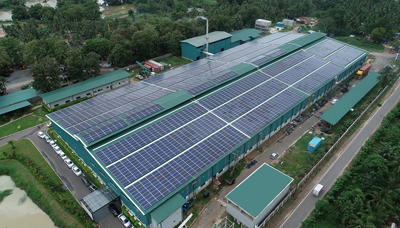GRI steps up green manufacturing efforts
Colombo, Sri Lanka – Sustainability is at the core of GRI, as such green manufacturing is a priority for the company. Mr. Ananda Caldera, Executive Director of GRI, speaks about the many initiatives taken by GRI to ensure green processes in manufacturing, where waste materials are recycled and used productively.
“The tire industry is one of the highest energy-consuming industries as we use both electrical and thermal energy in tire production processes,” explained Mr. Caldera. “For many years GRI has used biomass boilers to generate thermal energy and the steam we need to cure tires. For these biomass boilers, we use environmentally friendly alternatives such as the waste material generated by the sawmilling industry called outer planks. More recently, GRI started to use oat husks, which is a waste material from a neighboring and newly opened oats manufacturing plant, as biomass to generate thermal energy. The caloric value of the waste husk is almost the same as the wood waste. For thermal energy fuel we always use waste biproducts such as scrap wood and waste husk, thereby minimizing environmental impact,” explained Mr. Caldera.
Electrical energy is generated through the solar panels that have been installed on the roofs of the factories, which currently generate 1.2 Mega Watts. GRI plans to increase the capacity to 2.5 Mega Watts with the expansion of our new factory.
“Water is recycled in our facilities, where water used for washing purposes is treated and reused for maintenance of the landscape around the factory. We have a 24-hour water treatment plant that recycles the water,” explained Mr. Caldera. Treated water is then used as cooling water for machines and other purposes. As our tire production is a dry process liquid effluents are also not discharged into the environment. “It is also our policy that for every tree we remove for factory expansion etc., that we plant two trees. Furthermore, for our employees’ birthdays we gift them a tree sapling to plant in their gardens. We have planted more than 1,500 trees in and around our factories supporting biodiversity.” explained Mr. Caldera.
The rubber waste that is generated through the manufacturing process is given to the local reclaim rubber industry. Once this rubber waste is processed, GRI repurchases the reclaimed rubber and rubber crumbs to be reused. “The rubber waste essentially journeys a full circle and returns to the factory,” explained Mr. Caldera.
GRI has received ISO 50001 certification for our energy management system and ISO 14001 certification for our environmental management system. We receive credit for our energy management system because we use bio and solar energy. Furthermore, GRI uses the most energy-efficient motors so there is no wastage of electrical energy,” explained Mr. Caldera. The energy efficiency certification is only given to factories that have a qualified energy manager heading the energy program. “GRI focuses on energy efficiency from the time of selecting machinery, where priority is always given to machines with variable speed energy motors and low energy consumption,” said Mr. Caldera. With variable speed drives, the motor operates only at the required speed, thereby saving energy.
“Another green manufacturing step taken by GRI is that we have installed capacitor banks for power factor correction. Total power consumption and demand has reduced due to power factor correction. It is a noteworthy investment that has reduced energy consumption,” Mr. Caldera further explained.
“GRI is in constant pursuit of seeking sustainable alternatives to be used in our products and manufacturing processes. We invest in R&D and are continuously looking at ways to reduce our impact on the environment. Our goal is to build tires sustainably and to move forward in making a positive impact on our planet,” said Dr Mahesha Ranasoma, CEO of GRI.

